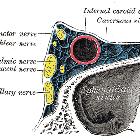Abducensparese

Abducens
nerve palsy • Abducens nerve palsy - Ganzer Fall bei Radiopaedia

Abducens
nerve palsy • Sixth cranial nerve infarct - Ganzer Fall bei Radiopaedia

Abducens
nerve palsy • Abducens nerve palsy - Ganzer Fall bei Radiopaedia
Abducens nerve palsy, or sixth nerve palsy, results in weakness of the ipsilateral lateral rectus muscle.
Clinical presentation
Patients present with horizontal diplopia with an inability to abduct the ipsilateral eye, thereby resulting in an esotropia (nasal deviation of the eye).
Pathology
The abducens nerve has the longest subarachnoid course of all the cranial nerves.
Etiology
- increased intracranial pressure
- results in downward displacement of the brainstem, causing stretching of the sixth nerve secondary to its location within Dorello's canal
- microvascular (e.g. diabetes mellitus)
- subarachnoid space pathology (e.g. subarachnoid hemorrhage, meningitis, neurosarcoidosis, neoplasm)
- cavernous sinus pathology (e.g. cavernous sinus thrombosis)
- pontine pathology (e.g. stroke, neoplasm, multiple sclerosis)
- trauma
See also
Siehe auch:
- Nervus abducens
- Moebius syndrome
- Musculus rectus lateralis
- Infarkt im Kerngebiet des Nervus abducens
- Nucleus nervi abducentis
- Godtfredsen-Syndrom
und weiter:

 Assoziationen und Differentialdiagnosen zu Abducensparese:
Assoziationen und Differentialdiagnosen zu Abducensparese:


